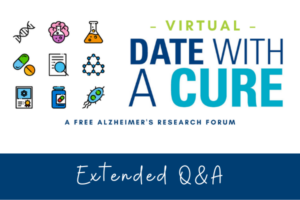 Thank you to those who attended the 2020 Date With a Cure research forum on Saturday, June 27th. We received quite a bit of positive feedback from attendees and wish we had an extra hour to answer all of your questions about dementia research! However, we reached out to the expert panel to get some more answers in this extended Q&A.
Thank you to those who attended the 2020 Date With a Cure research forum on Saturday, June 27th. We received quite a bit of positive feedback from attendees and wish we had an extra hour to answer all of your questions about dementia research! However, we reached out to the expert panel to get some more answers in this extended Q&A.
Q: We’ve seen expansion and success with telemedicine during the pandemic; do you think will we see it used more for clinical trials participation?
Dr. Sherry Soefje: The studies we are doing are not allowing or moving toward being able to do cognitive testing remotely. Additionally, the brain scans, of course, and other physical tests cannot be done remotely.
Q: What research is happening in the areas of diabetes (1 & 2) and dementia risk?
Dr. Thomas “TC” Chung: According to Mayo Clinic staff, a lot of research suggests a connection between diabetes and Alzheimer’s. Though these connections are fully understood, not all studies confirm the connection. Many do suggest that diabetics, especially Type II diabetes (T2D), are at a higher risk of eventually developing AD. Diabetes can cause damage to blood vessels (vasculature) that can reduce or block blood flow to the brain. Many people with diabetes have brain changes that are hallmarks of AD and vascular dementia. The best advice is to manage your diabetes and keep blood sugar low with medication, diet, and exercise.
A recent 2016 editorial in Frontiers in Endocrinology on the “molecular mechanism of neuronal dysfunction in the diabetic brain” reviews some of the links, factors, and potential mechanisms for diabetes contributing to AD. Read more.
Q: What is the relationship between traumatic brain injuries (TBI) and dementia risk?
Thomas “TC” Chung: In a 2014 JAMA Neurology retrospective cohort study on ~52,000 patients with trauma, 31.5% who had TBI concluded that those with moderate to severe TBI at 55 years or older or even mild TBI at 65 years or older had an increased risk for developing dementia. Younger adults, however, may be more resilient to mild TBI than older adults. Read more.
In contrast, a 2013 medical database review study concluded that there was no associated increased risk of dementia and chronic cognitive impairment (CCI) following mild traumatic brain injury (mTBI). Read more.
A more recent review cited the overall methodological weaknesses and lack of rigor citing only one study of 68 as having strong methodological rigor. Read more.
However, a 2018 Nature Reviews Neurology 14(9) describes the “risk of dementia after TBI – a cause of growing concern” concluding that new research demonstrated that even an mTBI without loss of consciousness is associated with a two-fold increase in the risk of dementia. Read more.
These illustrate that this research area is still evolving and being debated.
Q: What is happening in regards to long-term Ambien (or other medication) use?
Dr. Sherry Soefje: I am not aware of the research, but there is a correlation with increased risk of AD with long term sedative-hypnotic medications as well as with insomnia itself.
Thomas “TC” Chung: A 2015 population-based case-control study from Taiwan’s National Health Insurance Research Database, concluded that zolpidem use might be associated with an increased risk for dementia in the elderly population. An increased accumulative dose might result in a significantly higher risk to develop dementia in patients with underlying diseases, such as hypertension, diabetes, and stroke. However, they also concluded that the long-term effects of zolpidem (Ambien) on patients with Alzheimer’s disease might not be significant in the elderly population. Read more.
A July 16, 2019 post by Alzheimer’s Research UK also highlighted an Alzheimer’s Association International Conference 2019 presentation on the topic where two studies were presented that suggested that certain groups of people who take sleep medications may be at higher risk of developing dementia. The first from UCSF compared whites and African Americans, while the second from Alzheimer’s Research UK, compared women and men. The UCSF study found whites who take sleep medications from 5 – 30 a month have a 79% higher risk of developing dementia, while black people were less at risk. They found no increased risk in people’s sleep medications only sometimes, and found no risk difference between men and women.
Click here to watch the full online recording of Date With A Cure 2020. To learn about Alzheimer’s research in San Diego County, click here or contact Alzheimer’s San Diego at 858.492.4400.




